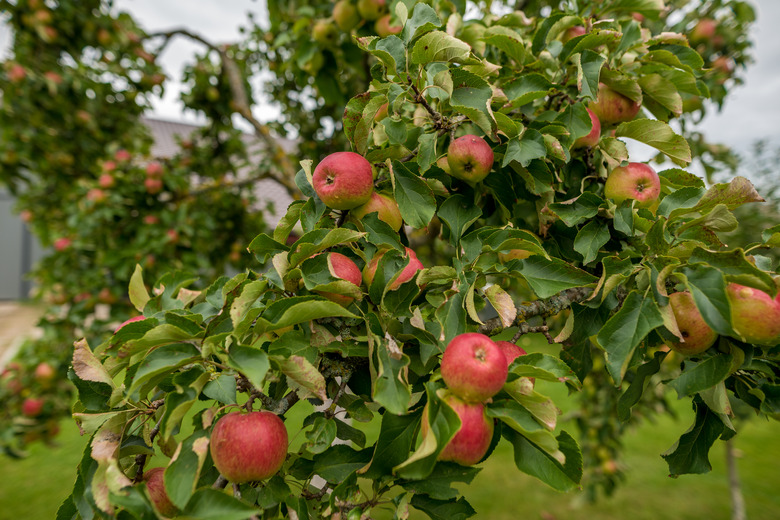When Do You Spray Apple Trees And With What Chemicals?
We may receive a commission on purchases made from links.
Harvesting apples from trees in your yard is a treat, but producing apples unflawed by disease or pests requires continual care and vigilance. Two primary types of sprays, whether organic or chemical, are needed: fungicides and pesticides. Apple trees (Malus domestica), as with most fruit trees, typically need spray maintenance in all four seasons.
Tip
Apples are susceptible to a wide range of pests and diseases, so they need to be sprayed with fungicides and pesticides in the late winter, spring, and summer, and sometimes in the fall as well.
Winter: Dormant Oil for Fruit Trees
Winter: Dormant Oil for Fruit Trees
The winter is time to treat apple trees with a dormant or horticultural oil if pests were present the previous season (which, of course, they almost certainly were if your apples are like most apples). Dormant oils target insects, mites, and some diseases. Some experts consider this winter dormant spray treatment to be the most effective for pest control than any other seasonal spraying.
Dormant sprays are either petroleum or plant-based and must be applied when the tree is dormant, before the buds open. Otherwise, it can smother the new growth, depriving it of oxygen. A common dormant oil is neem oil, a natural pesticide derived from the seeds of the neem tree. You can also make a homemade dormant oil with common household items.
Spring: Spray for Disease and Pests
Spring: Spray for Disease and Pests
In the spring, when the flower clusters open but the buds themselves haven't yet bloomed — called the "pink" stage — spray to control caterpillars; various hatching insect pests such as mealybugs, stink bugs, aphids, and mites; along with the fungal disease powdery mildew.
Typical pesticides to use at this time would be insecticidal soap and permethrin, if you want to maintain an organic treatment. This is also the time to introduce beneficial insects into your landscape.
For powdery mildew control, spray lime sulfur or a specialized summer horticultural oil, although you shouldn't use them together. To combat hungry caterpillars, use Spinosad or Bacillus thuringiensis, both of which are bacteria-based.
Warning
To protect honeybees, don't spray pesticides in late spring when flowers are open and fruit hasn't yet formed.
Early Summer: Catch Those Codling Moths
Early Summer: Catch Those Codling Moths
At least three weeks after full bloom or 10 days after the fall of the petals, start a preventive spray program to address codling moths, the primary apple pest. For these voracious moths, timing is critical. Summer hosts two generations of these moths, each six weeks long, meaning that apple trees need continuous codling moth protection for 12 straight weeks.
The most common organic method to control codling moths is to spray Spinosad and/or to individually bag the fruits just after petal fall, which excludes codling moths and also the apple maggot. Chemical options include Esfenvalerate or Acetamiprid. Be sure to follow the spraying directions and schedule listed on the product. Use protective gear, including gloves and masks.
In addition to spraying, inspect your trees regularly and remove any obviously stung fruit, i.e., those that show frass-filled holes in which the codling moth has invaded. Disposing of these avoids the larvae crawling out and beginning the next generation.
Fall: Clean Up and Spray for Mites
Fall: Clean Up and Spray for Mites
If mites or other microscopic insects have been a problem on your apple trees, fall is the time to spray. Most importantly, however, fall is the time to clean up under the tree and prepare it for overwintering.
Especially for codling moths, sanitation is your first step to preventing an infestation to start with. Clean up all dropped fruit — not just in the fall but throughout the growing season — to omit breeding grounds for moth larvae.
References
- University of Illinois Extension: Spray Schedule for Apple Trees
- University of Nevada, Reno Extension: Horticultural Oils – What a Gardener Needs to Know
- Washington State University, Chelan County Extension: Suggested Spray Schedule for Home Garden Apples
- Washington State University, Chelan County Extension: Suggested Organic Spray Schedule for Home Garden Apples & Pears
- University of California Statewide Integrated Pest Management Program: Codling Moth
